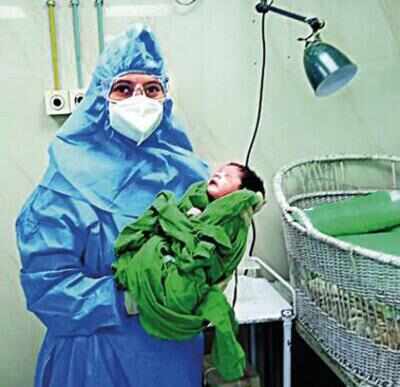Top Searches
- News
- City News
- mumbai News
- Mumbai: Deliveries of Covid-positive women at Nair hospital cross 1k
Mumbai: Deliveries of Covid-positive women at Nair hospital cross 1k

Nair, nodal centre for Covid-positive new moms
MUMBAI: BYL Nair Hospital in Mumbai Central achieved a remarkable feat by performing 1,001 deliveries of Covid-19-positive women—possibly the first by any public-run institution in the country amid the pandemic.
The hospital, which has remained the city’s nodal centre for Covid-19-infected mothers-to-be, facilitated the births of 1,022 babies, including 19 twins and a set of triplets since last April.
The gynaecology department had swung into action in mid-April last year, five days before it was decided to convert Nair into a complete Covid centre. Hurriedly, an alternate labour room in the adjoining building was set up for Covid-positive months. Soon, though, the hospital realised they would require not one but two labour rooms, the second one for suspect mothers. In the months that followed, the hospital delivered women who travelled all the way from Vasai, Virar, Palghar, Raigad and some even from affluent families with private hospitals shutting the door on many.
Dean Dr Ramesh Bharmal said the first delivery of a Covid-infected mother was safely carried out on April 14, 2020, and since then the gynaecology, paediatrics, medicine and anaesthesia departments have worked in tandem to facilitate over 1,000 births. Dr Sushma Malik, head of paediatrics, said they have seen less than 50 babies testing positive for the virus. “Our experience shows that the infection doesn’t travel in-utero. It can be transmitted through contact with the mother after birth,” she said.
The 1,000th delivery, a C-section, was carried out at 5.38pm by senior resident Dr Aastha Raheja on Monday.
Sneha Pawar, a 34-year-old, delivered a healthy baby boy. Second-year resident doctor Shayla Srivastava who carried out the first delivery in the makeshift labour room last year said the biggest challenge was to deliver babies wearing PPEs and goggles, while profusely sweating. “We are used to it now and the fear is much less,” she said. Gynaecology head Dr Ganesh Shinde said that even positive mothers were encouraged to breastfeed with proper precautions such as masking.
The second wave of the pandemic, though, has been more damaging, with increased infectivity of the virus and a surge in severe cases.
A total of 17 deaths in April alone came as a shock for the department that had not seen so many in nine months of the pandemic in 2020.
The hospital, which has remained the city’s nodal centre for Covid-19-infected mothers-to-be, facilitated the births of 1,022 babies, including 19 twins and a set of triplets since last April.
The gynaecology department had swung into action in mid-April last year, five days before it was decided to convert Nair into a complete Covid centre. Hurriedly, an alternate labour room in the adjoining building was set up for Covid-positive months. Soon, though, the hospital realised they would require not one but two labour rooms, the second one for suspect mothers. In the months that followed, the hospital delivered women who travelled all the way from Vasai, Virar, Palghar, Raigad and some even from affluent families with private hospitals shutting the door on many.
Dean Dr Ramesh Bharmal said the first delivery of a Covid-infected mother was safely carried out on April 14, 2020, and since then the gynaecology, paediatrics, medicine and anaesthesia departments have worked in tandem to facilitate over 1,000 births. Dr Sushma Malik, head of paediatrics, said they have seen less than 50 babies testing positive for the virus. “Our experience shows that the infection doesn’t travel in-utero. It can be transmitted through contact with the mother after birth,” she said.
The 1,000th delivery, a C-section, was carried out at 5.38pm by senior resident Dr Aastha Raheja on Monday.
Sneha Pawar, a 34-year-old, delivered a healthy baby boy. Second-year resident doctor Shayla Srivastava who carried out the first delivery in the makeshift labour room last year said the biggest challenge was to deliver babies wearing PPEs and goggles, while profusely sweating. “We are used to it now and the fear is much less,” she said. Gynaecology head Dr Ganesh Shinde said that even positive mothers were encouraged to breastfeed with proper precautions such as masking.
The second wave of the pandemic, though, has been more damaging, with increased infectivity of the virus and a surge in severe cases.
A total of 17 deaths in April alone came as a shock for the department that had not seen so many in nine months of the pandemic in 2020.
FacebookTwitterLinkedinEMail
Start a Conversation
end of article
Trending Topics
Top Stories Right Now
- indiaCovid live: India reports 3.82 lakh new cases, 3,780 deaths in last 24 hrs
- indiaCovid-19: 5 major states record highest-ever daily death toll so far
- sportsIPL 2021: Chakravarthy to Warrier to Mishra - How the virus travelled
- citySP ahead in UP panchayat polls, BJP opens back-channel talks with Independents
- indiaYear after Pangong clash, China reinforces positions, rotates troops along LAC